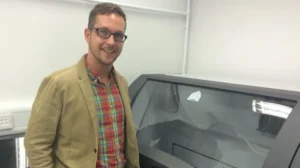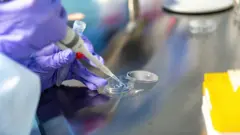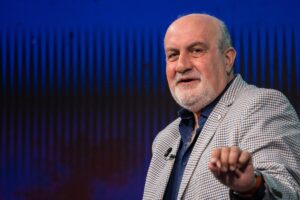Immunotherapy saved my life. Can research improve the odds for others?
Researchers are looking at making immunotherapy a much more effective treatment for cancer.

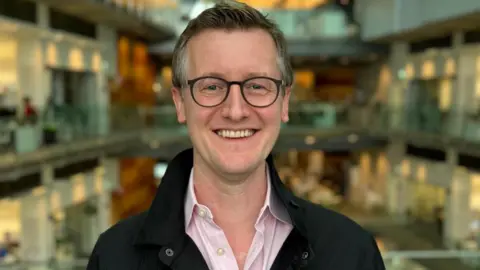 BBC News
BBC NewsAlex Green is clear – without immunotherapy, he would have died in 2019.
His advanced melanoma skin cancer was only stopped by the revolutionary treatment that recruits the body’s own immune system to fight the disease.
But unfortunately at the moment the majority of people with cancer see no benefit from immunotherapy.
Many suffer a relapse or experience significant side effects, which can include painful inflammation in the bowel, skin or the lungs.
So now a new multimillion-pound research programme aims to discover why at least half of all patients fail to respond to immunotherapy or suffer from those debilitating side effects.
Now 42, Alex was initially diagnosed with melanoma in 2012.
He was treated with surgery, but three years later the disease had spread to his lymph nodes.
Alex underwent several operations to remove the tumours, followed by a course of post-surgery radiotherapy, and then later, immunotherapy.
“I finished radiotherapy and my scans were clear, however under two years later my cancer returned,” he said.
“I was offered immunotherapy and it completely saved my life.
“Without it I was expected to have died in 2019, leaving behind my wife and two children, then aged four and seven.
“It was a life-changing treatment for me and I’m now in my eighth year of complete remission and able to lead a normal and active life.”
But Alex, a lawyer who lives in Surrey, warns the treatment is not straightforward.
“Whilst the treatment’s results have been amazing, it did come with some tough challenges,” he said.
“I suffered from some pretty significant side effects, which resulted in me being hospitalised for two weeks.
“I’m very clear on the importance of researching and understanding immunotherapy side effects to make the treatment as effective and as kind as possible.”
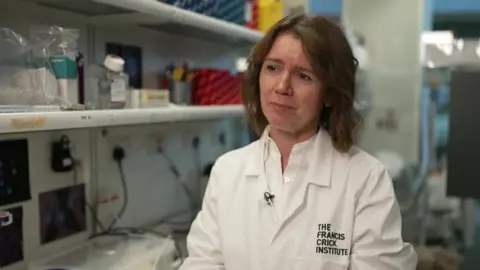
The research project involves 16 academic institutions and NHS trusts and health boards from across the UK, working alongside 12 bioscience and technology companies.
One of the issues the researchers will look at is a lack of testable and usable biomarkers, which are the tiny molecules which can tell doctors whether someone is likely to benefit from a given drug.
Identifying these biomarkers could help in two ways – both selecting those patients who are most likely to benefit, but also possibly opening up new treatments, like vaccines and cell therapies.
The project will involve 3,000 patients who have already completed their treatment and then 3,000 more who are starting treatment across the UK for breast, bladder, kidney and skin cancer.
Other forms of cancer could be added as the research progresses.
Professor Samra Turajlic, who is a cancer specialist at the Royal Marsden hospital, will be leading the project at the Francis Crick Institute in London.
Prof Turajlic says huge progress has been made in cancer treatment in recent years using immunotherapy.
“We are still underserving many patients due to treatment failure and side effects,” she said.
“We have a unique opportunity in the UK, especially given the NHS, to address this challenge.
“Research on this scale can get us one step closer to better tests in the clinic, but also fuel more discoveries regarding cancer immunology and new therapies.
“Ultimately, we want to speed up the delivery of personalised medicine for a disease that affects huge numbers of people across the UK every year.”
‘A virtuous circle’
Funding for the project comes from various sources, including £9m from the government-run Office for Life Sciences and the Medical Research Council – two organisations that support research and innovation to improve healthcare in the UK. An additional £12.9m comes from industry.
The project is part of a bigger commitment from the Department of Science, Innovation and Technology for £145m to support cancer diagnosis and treatment and has the backing of Science and Technology Minister Peter Kyle.
“Cancer is a disease that has brought pain, misery and heartbreak to every family in the country, including my own,” he said.
“But through government working in partnership with the NHS, researchers, and business, we can harness science and innovation to bring the detection and treatment of this horrendous disease firmly in to the 21st Century, keeping more families together for longer.
“The UK’s scientists, researchers and captains of industry have brilliant ideas that aren’t just going to boost our health – they’ll boost our economy too, helping to build a virtuous circle for more investment in both health and research which will ultimately drive up living standards.”



